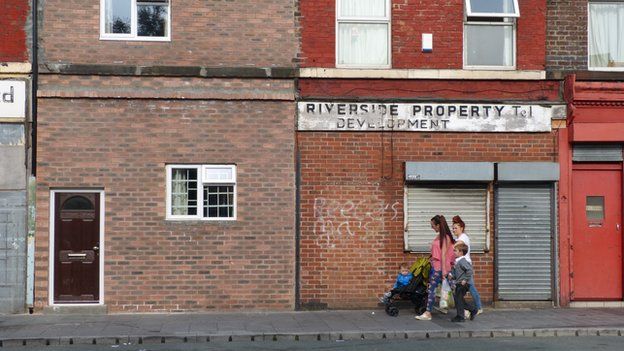Budget 2015: Squeeze to hit 13m families, says IFS
- Published

Thirteen million UK families will lose £260 a year on average because of the Budget's tax and benefits changes, says the Institute for Fiscal Studies (IFS).
Tax credit changes could hit three million families, which are likely to lose an average of £1,000, it said.
Even taking into account higher wages, people receiving tax credits would be "significantly worse off", said Paul Johnson, director of the IFS.
The chancellor said most workers would be better off under Budget changes.
The Budget also included the introduction of a National Living Wage, which is to be introduced from next year. George Osborne said on Wednesday that it would rise to £9 an hour by 2020.
A spokeswoman for the Prime Minister, David Cameron, dismissed criticism of the Budget as "regressive", saying that it was designed to boost take-home pay while reducing benefits and welfare.
She added: "It keeps us on the path to stronger economic security, with lower spending and an economy which lives within its means."
Incentives 'reduced'
The biggest impact on families will come from the freeze in working-age benefits and the changes to tax credits, said Mr Johnson of the IFS.
Paul Johnson says those out of work are being protected "at the expense" of those in work
"It will reduce the incentive for the first earner in a family to enter work," he said.
The IFS analysis suggests that those in work - but receiving low salaries - will be the worst-affected.
Those in the second poorest category are likely to lose more than £1,200 a year. By contrast, the richest 10% stand to lose less than £400 each. And those in the second wealthiest category will be better off, by more than £100.
The number of families affected under the IFS analysis includes those who claim Child Benefit - which will be frozen from April 2016. The majority of families claim the benefit.
Benefits Freeze
Most working-age benefits frozen from April 2016. Includes Job Seeker's Allowance, Employment and Support Allowance, Child Benefit and some Housing Benefit.
Replaces 1% annual up-rating since April 2013.
George Osborne said anyone working full-time on the National Minimum Wage - taking into account taxation changes - would be better off.
Under the new National Living Wage, all workers over the age of 25 will earn a minimum of £9 an hour by 2020.
Speaking to the BBC, he said the changes amounted to a new contract with the country, which offered fewer benefits, but higher salaries.
Chancellor George Osborne has rejected criticism of his Budget, as Robert Peston reports
"This is a fair deal - because you've got to have a welfare system that's fair to the people who pay for it, as well as the people who need it," Mr Osborne told the BBC.
However the IFS said that higher wages would not compensate for cuts to tax credits.
"There is simply not enough money going in to the new minimum wage to anywhere near compensate - in cash terms - people on tax credits," said Mr Johnson.
Tax credit changes
From April 2016, anyone earning more than £3,850 a year will have their Working Tax Credit reduced more steeply. Previously they could earn up to £6,420.
From April 2017, new claimants for Child Tax Credit will not be able to claim for the third, or subsequent children.
Working parents at a childcare centre in Cardiff discuss tax credits
'£3,450 worse off'
Earlier the Resolution Foundation - a think tank that campaigns for low and middle-income families - also warned that the changes to tax credits could "weaken the incentive both to enter work, and earn more."
Taking into account the new National Living Wage, the Resolution Foundation said many families will still lose out.
According to its calculations, by 2020:
- A low-earning single parent with one child, working 20 hours a week at £9.35 an hour, will be £1,000 a year worse off.
- A low-earning dual-earner couple with two children will be £850 a year worse off
- A middle-earning dual-earner couple with two children, each earning £15 a hour, will be £350 better off, as a result of increases in the personal tax allowance.
However, it said some families moving on to Universal Credit, or applying for tax credits after April 2017 could face much bigger losses.
For example, a low-earning couple with with three children making a new claim would be £3,450 worse off, following the tax and welfare changes set out in the budget.
"We shouldn't think that a higher minimum wage will compensate all low income working families for their losses - many working households will be left significantly worse off," said Gavin Kelly, chief executive of the Resolution Foundation.
- Published1 April 2016
- Published9 July 2015
- Published9 July 2015
- Published6 July 2015